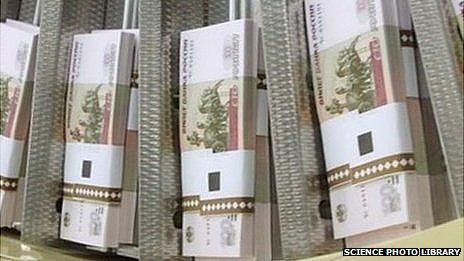The impact of economic sanctions on Russia
- Published
- comments

The US and EU have imposed economic sanctions on Russia over its annexation of Crimea from Ukraine.
The Russian stock market and rouble have fallen and two of the major ratings companies have downgraded Russia's credit outlook and growth forecasts for the year.
Do sanctions work?
A long-term study published by the Petersen Institute finds that economic sanctions are partially successful about one-third of the time.
Of the 174 cases that they examined dating from World War One, the most successful cases were when the goal was modest, such as the release of a political prisoner, where there was 50% success.
When the aim was more ambitious, such as changing a major policy, the success rate drops to about 30%.
For instance, US economic sanctions against Cuba since the 1960s were largely judged as a failure as the embargo hurt the living standards of the people in that country with no discernible effect on regime change.
But more recently, the sanctions against Iran - that included blockades of oil and overseas bank accounts - helped push the Iranians towards the negotiating table to agree to inspections of their nuclear programme.
The Iranian economy had suffered from the sanctions imposed in 2012. GDP fell by nearly 6% last year and inflation hit double digits, averaging some 39%.
The sanctions imposed on Russia are targeted at freezing assets and imposing travel bans on key Putin allies. Russia is imposing like-for-like sanctions in return.
The next question is whether there will be large-scale economic sanctions against Russia?
Some investors are not waiting to find out. The ratings company S&P estimates that $60bn (£36bn) left the country in the first three months of the year, which is nearly as much as the entire outflow from last year.
The other thing about such economic sanctions is that they will often harm those who impose them.
In the Iranian case, oil prices rose in the aftermath of the 2012 embargo, topping $110 per barrel.
It forced European refiners, who imported about half a million barrels a day, to seek alternatives, for instance.
As I have written about before, given that Russia is the largest energy supplier to Europe and is also one of the top three oil producers in the world, there will be broader economic consequences and not just for Russia.
As President Obama has signed an order to impose sanctions on sectors of the Russian economy, it looks like the next step may well be escalating sanctions.
The US and EU will want this to be one of those one-in-three times when such actions work.